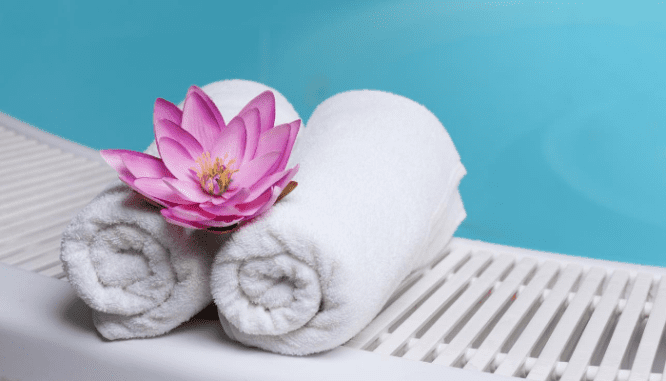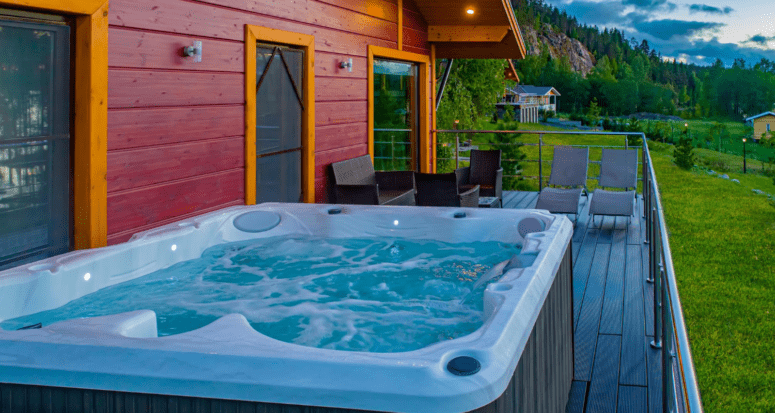Will Homebuyers Love or Hate That Your House Comes with a Hot Tub?
- Published on
- 7 min read
-
 Emma Diehl Contributing AuthorClose
Emma Diehl Contributing AuthorClose Emma Diehl Contributing Author
Emma Diehl Contributing AuthorEmma's work has been featured in Huffington Post, NPR and XOJane. When she's not combing her neighborhood for open houses, she's writing about technology, real estate or data.
After a long day, you enjoy nothing more than a relaxing soak in your hot tub with the bubbles full blast, temp set at the perfect 103 degrees, and a cold beverage in hand. Perhaps you’ve even got a whole backyard oasis with a platform deck, solar lights, and ornamental grasses built around a lovely hot tub that still runs like a charm.
But now that you’re ready to sell your home, you’re wondering whether your little slice of spa-like heaven will resonate the same with potential buyers. Would you be better off selling the hot tub separately, to get more value out of what you paid for it? Or could the hot tub be an attractive feature that helps you fetch a higher price?
Here’s what real estate experts have to say about selling a house with a hot tub, including:
- General buyer interest in homes with hot tubs
- The resale value of hot tubs
- Your options for removing the hot tub before the sale
- Staging your hot tub with spa touches to impress

How hot tubs affect your home price
Generally, there are two types of hot tubs: in-ground and freestanding. In-ground or built-in tubs, as the names suggest, are an actual fixture of the property. They may come on their own or as a package with a pool. In-ground tubs are harder to remove and haul away, as opposed to free-standing varieties. Free-standing hot tubs are like above-ground pools. You can see the structure, which sits above ground surrounded by a shell, often on an elevated deck or platform.
The value of in-ground hot tubs
“I have appraised many homes with built-in hot tubs, but really didn’t see any major value add on their own,” explains Jamie Owen, a Cleveland-area appraiser, and host of appraisal podcast Home Value Stories. “Interestingly though, most of the homes I have appraised with built-in hot tubs also had in-ground pools.” In his experience the value added from the in-ground pool included the in-ground hot tub as well.
If your home just has an in-ground hot tub, it will add value to your property, but not in the way you might expect. Chances are, your appraiser will consider it a landscaping project, taking the stone work and yard work into account, and that’s where some value may be calculated.
The value of freestanding hot tubs
“I have never seen any market data to suggest that [freestanding hot tubs] add much if any value,” says Owen. Free-standing hot tubs are considered personal property and aren’t factored into the overall value of the property.
However, even a free-standing hot tub can be built into the ground. In that case, the permanent structure around it makes it an in-ground hot tub, and it would be valued by the same standards as an in-ground tub.
That said, if you’re looking to get some actual value out of the freestanding (above ground) hot tub, you’re likely to get more from selling it separately to a buyer than you would in the form of selling at a higher price.
A quick glance at Facebook Marketplace shows that well-maintained, larger hot tubs can go for $1,000-$3,500, while smaller varieties are often listed in the $700 range.
You also have to weigh the work put into selling it, coordinating with buyers online, negotiating the price of your hot tub, and arranging to have it hauled away. And, as we’ll discuss below, a hot tub in great condition can be viewed as an added bonus to buyers, which may make it worth including in the sale of your home.
If your hot tub isn’t functional…
While in-ground and free-standing tubs won’t add much value to a property, they will detract value if they’re not working. The buyer will have to haul the tub away or have it repaired, meaning it’ll cost them money, and that kind of work will detract from the listing price upfront.
From an appraisal standpoint, a non-functioning built-in hot tub will negatively impact a home’s value since it’s part of the property. But that’s not necessarily the case for a free-standing tub unless it’s an eyesore and detracts from the overall curb appeal.
Will buyers love or hate the idea of a hot tub?
Buyers generally break down into two camps: hot tub lovers and haters, says Jen Stauter, a Madison, Wisconsin real estate agent, and proud owner of two hot tubs. “Some people are willing to take it on because it’s a little bit of luxury, but others are really afraid of the maintenance,” she explains.
Some buyers will see the hot tub as a burden, Stauter says, while others might even consider it a safety hazard due to chemicals involved in upkeep or dangers around young children playing in them.
But even hot tubs lovers don’t have the feature as a must-have in their real estate search, says Matt Kornstedt, a Madison-area agent with over two decades of experience selling homes in the area. “If they really want a hot tub, they’ll purchase it down the line,” he explains.

Should you sell your hot tub before listing your home?
While it’s rare to find a buyer who needs a home to come with a hot tub, “it’s pretty common that if there’s a hot tub, the seller would leave it just because it’s usually all set up for it,” Stauter explains.
Unlike personal property like a washer or dryer, hot tubs have specific wiring set up outside that’s a bit harder to move. You’ll need a specialty mover to take it to a new property, which costs $375 on average, estimates Thumbtack.
Selling a hot tub second hand is not unlike selling a used car — both lose value the second you take them off the lot. Not factoring in the cost to haul it, sellers can expect to sell their tub from between 25% and 33% of its original sales price, if the tub is still in full operating condition.
Like a car, some hot tub dealers will offer trade-in deals. Some trade-in deals might just be free hauling and installing, but others include a discount on your future tub. If you plan on installing a hot tub at your new home, you might consider trading the tub in for a discount on your new one.
What will buyers want to know about the hot tub?
If you decide to sell your hot tub on the second-hand market or include it in the sale of your home, make sure you’ve got an answer for the following specifics:
- Age, size, water usage.
Industry-standard sizes include small (2-4 people), medium (5-6 people), and large (7+ people). Check your tub’s manual to determine water usage, or use this guide to measure out how much water your tub holds. - Does a hot tub increase homeowners insurance?
Because a hot tub has its own set of liability and safety concerns, homeowners will need additional insurance coverage. - What about upkeep?
According to HomeAdvisor, the cost to maintain a hot tub annually will cost between $500-$1,200, depending on factors like hot tub model, age, and climate. Keeping a hot tub in working condition will require monthly to weekly maintenance from the homeowner, depending on usage. In addition to the time checking the tub’s chemicals, a homeowner can expect to spend around $20 a month on chemicals and upkeep tools. - How much electricity will it use?
The amount of electricity will vary dramatically based on age and daily usage, but homeowners can expect to pay between at least $20-$40 a month in electricity to keep the tub bubbling.

Staging your hot tub for sale
When staging your hot tub for sale, you’ll want to make it an oasis on the property, says Stauter. Make your hot tub shine with these steps:
Do a deep clean inside.
Your hot tub will have to be emptied for a successful deep clean, but make sure to administer a line flush product beforehand to clean up any gunk that’s accumulated in the jets and lines, recommends home pro Bob Vila. After emptying the hot tub of water, thoroughly clean the interior using a hot tub cleaner and a towel. Finally, remove the filters and replace them, or clean them off with a hose before refilling the tub.
Deep clean the outside.
Scrub down the shell of your hot tub with a mild all-purpose cleaner and a rag. Spray the tub’s cover with a hose to remove dirt and build-up. Scrub the cover in a circular motion with a baking soda paste to clean through the grime, then rinse and dry with a towel.
Add a pile of fresh white towels.
An artfully folded pile of fluffy white towels on a tray positioned next to the hot tub will make it hard for a hot tub-loving buyer to resist.
Keep the tub open and bubbling during showings.
You won’t entice buyers with a covered cube during showings. Instead, keep the hot tub open and bubbling, showing off the jets and interior lighting.
Make the hot tub a destination.
Keep a clean wooden bench or set of stairs next to the tub — it’ll make buyers feel like relaxation is only steps away and remove any concerns about safety and slipping when entering or exiting the tub. Consider staging outdoor furniture near the tub too, so it feels more like a destination in the yard or on the patio.
Play up the tub in marketing.
“I’d make an Instagram story or video highlighting the property’s tub,” Stauter recommends.
“The people who are going to want it will be attracted to the listing because of it.”
Featuring it in video or image on social media means you can highlight the spot during the day, as well as at night. Consider mounting outdoor lights around the hot tub to make it feel extra special in the evening.
Staging the hot tub to be a tranquil spot for relaxation will draw in the buyers who are a fan of the feature.

Your hot tub is broken — should you remove it before selling?
A broken hot tub is an eyesore on a property. Unless you plan on factoring the cost of repairs or hauling the property into the listing price of the home, you should remove it before putting the property on the market.
Tubs are large, heavy, and dangerous to move on your own. Hire a service like 1-800-JUNK or Junk King to remove the tub from your property. Both services will provide a free estimate before removing the hot tub.
If you don’t want to pay to have the hot tub removed, you could try listing it for free on Craigslist or Facebook Marketplace for free, as long as the buyer can pick it up themselves.
For the right buyer, a (working) hot tub is a bonus
Neither an in-ground nor above ground hot tub will add much appraised value (if any) to a property, but highlighting it as a luxury in your listing could make the feature feel like an unexpected bonus. So get a feel for your market and weigh whether you’d rather appeal to hot tub enthusiasts in your marketing, or try to get back some of what you paid for the hot tub by selling it separately online.
The latter route will require a little extra effort on your part, and with all the special wiring setup for a hot tub on the property, you might be better off leaving it be. Whatever you do — if the hot tub isn’t working anymore or looks ratty — get rid of it so it doesn’t detract from the sale.
Header Image Source: (FOTOGRIN / Shutterstock)
